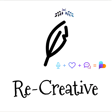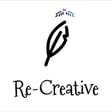
Catherine Fitzsimmons
Mark and Joe are thrilled to welcome Catherine Fitzsimmons to the show. Catherine is the founder of Brain Lag, an acclaimed Canadian science fiction and fantasy press that has now published fifty books!
Catherine is also a writer, with six novels under her belt, and an artist in other ways. She explains how the press came to be and the role it plays in Canadian publishing.
She's the first guest to discuss early-to-mid-nineties Nintendo-style games. The three discuss the differences between video games, fiction and other narratives such as television. This leads into how Catherine got into music and other forms of art, and how it feeds everything she does.
For more information, check out the show notes for this episode.
Re-Creative is produced by Donovan Street Press Inc. in association with MonkeyJoy Press.
Contact us at contact@donovanstreetpress.com


